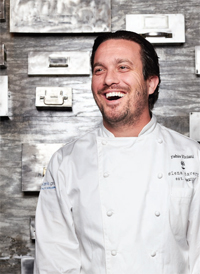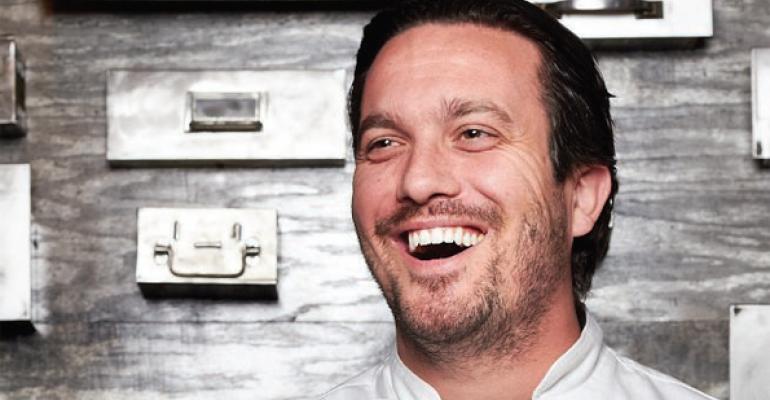
Fabio Viviani, perhaps more so than any Top Chef contestant, works tirelessly on burnishing his personal brand. He owns two restaurants in the Los Angeles area, has partnered with Yahoo! on an internet cooking/lifestyle show, Chow Ciao!, has deals with Bialetti Cookware and Bertolli Olive Oil and is poised to release a new cookbook. Now Viviani has teamed up with Chicago-based DineAmic Group on Siena Tavern, a 10,000-square-foot rustic Italian spot that opened recently in the city’s River North neighborhood. He and DineAmic owners Lucas Stoioff and David Rekhson are eyeing more deals throughout the country. Viviani took a brief break from his empire-building efforts to talk about this latest project and his future.
RH: Siena Tavern just opened. What kind of reception have you had so far?
Viviani: More than 1,500 people showed up for the opening. It was 23 degrees and there was a line out the door for three blocks. This was by far the smoothest opening I have ever had. DineAmic is amazing. This is our first project together, and I couldn’t be happier. Everything was well-thought-out, from the décor to the drinks program, and the staff had two months of intensive training.
RH: How did you end up partnering with DineAmic?
Viviani: I have been living in Chicago four or five months out of the year for the past five years on consulting jobs. On one visit I was staying at a hotel in the River North area. I wanted a burger and good beer, and someone told me to go to Public House (a DineAmic concept). I went there and had a great burger. They had a fantastic beer program and staff there, too. For the next three nights I went there on my own and tried different things on the menu. Then I asked, “Who owns this place? It’s very well-run.” Lucas Stoioff and David Rekhson were sitting next to me. I introduced myself, and the rest is history.

RH: How did the Siena Tavern concept come together?
Viviani: Once DineAmic asked me to do business with them, I said great, but there is one condition: We will go to Italy and we will eat, live, shop, walk, think and sleep like Italians. Once you understand how things are there, we’ll come back and open a restaurant.
The first night we had dinner at my mom’s house, and a number of menu items at Siena are from that meal. We have a connection to the Old Country—for example, we import the flour for our pizzas and pastas from a mill that produces it especially for us. But there is a modern twist to the menu as well, some American classics with an Italian twist. We want to make it appealing enough for people to want to come in two or three times a week.
RH: What’s next for you and your partners?
Viviani: I have the restaurant experience; they have the back-of-house expertise. We are going to build more concepts together. We are talking about a steakhouse and other concepts.
Juggling restaurants, TV, a cookbook
RH: Will you still maintain your other restaurants? How do you keep all those balls in the air?
Viviani: Yes. I have two in L.A. and some low stakes in operations in Italy. I’m also opening another one in Newport Beach, CA. How do I do this? I’m really good (laughing), but I have fantastic people on my team, and they have great people working with them.
People ask if I’m going to be in Chicago every day. I have six restaurants. I have been in Chicago every night for the past week. I’ll be there until the restaurant is up and running. I am very present in every restaurant I do. Until the food is there and everybody gets it, I don’t move. But unless you want to be employed by somebody for the rest of your life, you have to create opportunities for expansion.

RH: What’s the focus of your upcoming cookbook?
Viviani: I asked myself a question: Do I want to have another book out there that’s a collection of Italian recipes? I need to enhance people’s lives in some way. So I talked to my mom for a couple of years about my family. My book is what (Anthony Bourdain’s) Kitchen Confidential would be if it had recipes and no drugs and no rock and roll. Italian Kitchen is a family memoir. It contains about 150 family recipes, some of them never shared before.
RH: How does the Yahoo! Chow Ciao series work?
Viviani: The videos are all about eight minutes long. The episodes cover great, simple food with an Italian twist. It teaches people how to get hold of simple ingredients and turn them into something extraordinary. Millions see it each week. The show is syndicated in 15 countries. Every Monday there is a new one. I lock myself in a studio for 20 days, do a few episodes a day, then don’t think about it for a while.
RH: How much of your success do you attribute to the power of television, and how much to your talent?
Viviani: Television is the kind of exposure you can’t pay for. It’s a blessing. Every business requires knowledge. If you don’t have solid principles, if you don’t have knowledge, if you’re not an expert at what you do, TV can’t help you. How many contestants have appeared on Top Chef over the years since the first season? How many of them are making something of it? Maybe they have the culinary skills to be able to work in a restaurant environment. But they don’t have the right business skills to be able to make it outside of a restaurant.
I had a business before Top Chef. What did TV do for me? It showcased who I am. I’m a nice guy. I try to be nicer than anybody. I try to be honest all the time and stand on my principles and not get caught up in cameras and fame and extra money and toys—that’s not how I grew up, that’s not who I am. I’m the hardest working person in the industry. If tomorrow television goes away, I’ll still be fine and still have a very healthy business. For half the people in the food business, if TV goes away, they are screwed.




